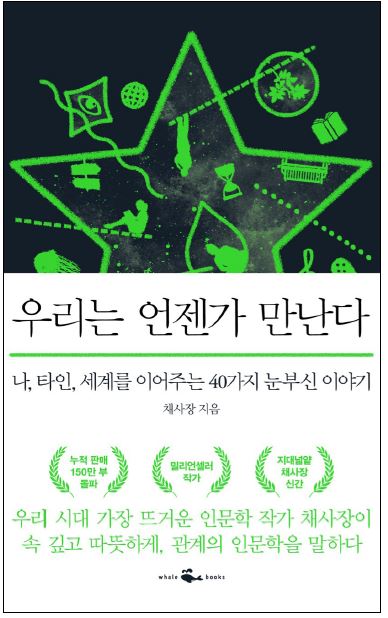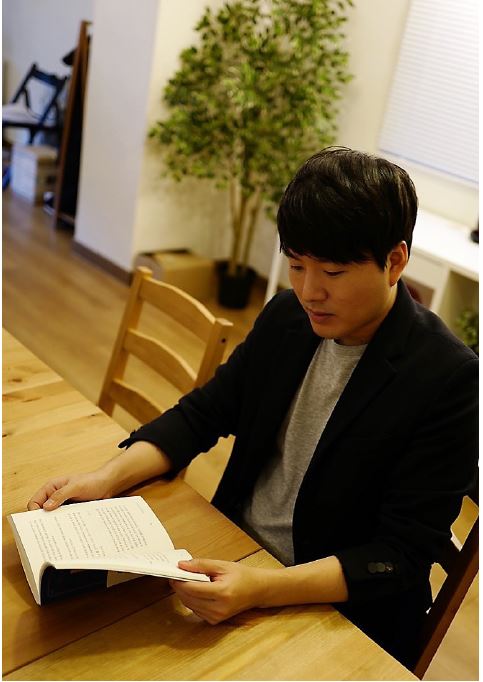”How is your week going? I’m Chae Sajang, and I’m interested in neoliberalism and mystery.” Have you ever heard a person saying this, in a calm soothing manner? Perhaps you have heard about the bestselling book, <Wide and Superfi cial Knowledge for Intellectual Conversation(2014)>. The book is based on the podcast of the same name, which gained huge popularity. SMT reporters interviewed Chae Sajang, writer, lecturer, and seeker of worldly insight about humanities about his new book <We’ll Meet One Day(2017)>.

Would you please describe the podcast series ‘Wide and Superficial Knowledge for Intelligent Conversation(W.S.I.C.)’? What made you create the series? Why did you decide to end the series last August?
At the time, I was looking for an outlet to express my thoughts, something not for profit but enjoyable. I soon came to discover that there is nothing more interesting than meeting and talking to others. I started to gather a following of people I met at work who were not interested in assimilation into society norms, but more interested in something metaphysical and idealistic. We met once a week to discuss philosophy, art, politics, and the world. As the number of listeners grew, creating a weekly broadcast soon became burdensome because the listeners demanded much more information, and they wanted in depth that was presented in interesting way. I want to live up to their expectations. While I learned a lot in the process, I was exhausted daily from the work. Like Nietzsche’s Zarathustra who comes down to the world. Once his glass is empty, he returns to the mountain to fill it once more. I felt it was time to replenish the glass of each panel. Once glasses are full again, panel members will return even if they don’t necessarily return as a podcast series.
Beginning with <W.S.I.C.(2014)>, you have continued to publish books yearly. What made you decide to write your first book?
Because I was angry. At the time, I had an active social life, so I was out constantly meeting people. I found a good many sincere people around the world. They all believed in the old adage “I’ll do my best and work hard” with the hope of becoming financially stable enough to have a family and raise children.
Reality, however, is harsh. Economic independence and the acquisition of wealth are not always achieved solely by individual effort. There are the social constraints of society structures. There is class conflict between the few capitalists and the large labor force. People need to become aware that the production tool, the labor force, is exploited by the capitalists’ desire for profits. The government should monitor the issues and become a more active mediator.
This is why I wrote <W.S.I.C.>. I wanted good sincere citizens to understand the economy is driven by the political system, so there is great need to vote, and to vote wisely for someone that represents the nation’s best interests.
Prior to your present career, you have worked in a variety of fields. How did these experiences help you as a writer?
There are two kinds of people in this world, those who read and those who work. Those that like to read, enjoy life and living. The person builds a small castle from the pages of a book and peers into the world through the tiny window the book offers. The person sees others who sway through the waves of reality as foolish and unteachable. But the person is also swayed and wander around reality.
For those that work, these people learn tricks that keep them alive during the storms of reality. They earn and spend money and know nothing else. This person cannot talk about the truth, ideals, art, philosophy, nor their own soul.
We need a balance. People need to read and work at the same time. I couldn’t keep a balance. At college, all I did was read. After college, all I did was work. It took me a long time to realize both are essential for life. I write, lecture, and meet with others so that they too become aware of this realization. I’m glad I had a chance to meet them all experience from my careers.

In your recent book <We’ll Meet One Day(2017)>, you discuss relationships philosophically. Why did you choose to center on this topic?
Publishing <We’ll Meet One Day> was inevitable. Until this book, I focused on the world in books like <W.S.I.C.> and <The Culture of the Citizen(2015)>. They looked at things right in front of from historical, economic, political, and social perspectives. They also dove into philosophy, science, arts, and religion. However, to better understand the world, one also needs to explore the ‘self’. The result of which was <Eleven Stairs(2016)>. That book looks at how the ‘self’ matures in the world.
After exploring the world and the self, I realized the need to discuss the relationship between the two. This relationship between the world and the self is not simple. The self forms connections with the world, others, and the invisible realm of death. The result was <We’ll Meet One Day>, a book that looks at the world and the self.
Your recent book is a compilation of forty individual stories. Which has had the most impact on you?
All stories remain dear to my heart, so I’ll talk about one that university students will be able to most relate to. It is the twelfth story, titled [Is It Okay to Live Life to the Fullest?].
‘Everyone says that there are a few people and only a few people put everything into their goals while others don’t. However, that’s not true. Contrary to popular thought, these people are quite common. The easiest thing to do is to make excuses for stalking on the path to one goal. The reason for this is not because they’re convicted but they are weak. With the belief that they don’t have enough experience in the real world to survive, they simply choose the easy road in life and focus on the thing that seems clear to them.’
People at university are at an age when life is full of possibility. There is so much the world holds for you. Please do not define yourselves as mere existence without the effort of investigating the world outside your comfort zone.

Where do the inspirations or ideas for your books come from?
I don’t look for ideas. Today, there are lots of ideas and information readily available in the world. Throughout human existence on the planet, only people of today have access to the stockpiles of accumulated information. My approach to writing is to utilize this information by categorizing what is already known. I take the information and organize it into understandable structures. I started with this approach to writing and continue with it. I have covered the topic of world, self, and relationship between the two, and I will continue to write books about them.
So far you have challenged various fields. What do you most worry about or what concerns you the most?
I have not run into any particular problems. Some writers claim writing is very painful and difficult. Indeed, it is hard, but I think they exaggerate the pain. Of course, publishing is hard. A writer works from morning to late night in front of a computer revising their work, but when I recall my days as a company worker, I think I live in comfort.
Going out into the world and maturing into an adult, one realizes ‘real’ hardships are non-existent. No one will demand the unachievable like flying in the sky or making wind just by clapping. Both schools and companies toss us task that need to be performed. Work is not what is hard. Human relationships are what is hard. Consider work at a company. There are the relationship between superiors and subordinates. Some people are stubborn, others are tiresome, and others find it hard to make the right choices, compromise injustice, and submit in suppression.
Through these experiences, we learn to slow down, mediate, be patient, and to be persuasive. We learn how to work flexibly in the society. The source of problems and worries was always relationship with others. In those respects, I suppose a writer learns to struggle with their ‘self’, so it is shameful to exaggerate such pain.

How do you overcome adversity?
When it comes to relationships, I get hurt easily. I’ve gotten angry, cried silently to myself, and felt exhausted and fatigued by others. I’m sure other people will say the same about me. I’ve never managed to overcome the struggles I face dealing with others. However, as I age, I become more and more flexible. Making mistakes and living with regret are experiences that I draw from and they make me feel relaxed when I encounter hard times.
People in their twenties are passionate. Everything is new and they are full of youth and confidence. Take heed. One day you will break and doubt yourself. But keep in mind, the process makes you stronger and wiser. Think about your parents, teachers, and the millions of other adults. They have all gone through similar things. Only when your sharp eyes and mind become calm after experiencing hard times will you see a benevolent and wise adult in front of the mirror.
Could you tell us about your future plans? Will you challenge something new?
I have short-term, soon-to-come, and long-term plans for the future. First, I hope to establish an investment company. Capitalism is a distinctive and interesting system. The huge flow of capital creates microscopic images of political, social, and cultural systems in the world. I’ve always been interested in this symbiosis. Also, I think investment is an activity that connects them all. I’m slowly working towards this now.
In the soon-to-come, I hope to develop into a good person. It’s my hope that at my passing, people will gather and say, “He as a good person. I’m glad I got to know him through his books.”
My long term plan is to pass peacefully. I don’t wish to be reborn. I am not religious, but I do think people return to the Earth due to regret or remorse. I will life without regret and cause no pain to others. In this way, there will be no need for me to return to life. I will do my best in life and live without regret.
CHAE SAJANG
- Host of the Podcast series ‘Wide and Superficial Knowledge for Intellectual Conversation’, which enjoyed top ranking on Podcast charts
- Writer of the million copy bestseller <Wide and Superficial Knowledge for Intellectual Conversation(2014)>
- Writer of <The Culture of the Citizen(2015)> that discusses the reality of the humanities
- Writer of bestsellers <Eleven Stairs(2016)> and <We’ll Meet One Day(2017)>
Kim Lee Jihyun / Editor-in-Chief / smt_kjh@sookmyung.ac.kr
Kim Ma Seunghee / Reporter / smt_msh@sookmyung.ac.kr
Kim Shin Hyerin / Reporter / smt_shr@sookmyung.ac.kr


